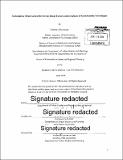Participatory infrastructure monitoring : design factors and limitations of accountability technologies
Author(s)
Offenhuber, Dietmar
DownloadFull printable version (15.41Mb)
Other Contributors
Massachusetts Institute of Technology. Department of Urban Studies and Planning.
Advisor
Carlo Ratti.
Terms of use
Metadata
Show full item recordAbstract
This dissertation investigates practices of participatory infrastructure monitoring and their implications for the governance of urban infrastructure services. By introducing the concept of infrastructure legibility, the three essays of this dissertation investigate ways to make waste systems and their governance more legible: its formal structure, its informal practices, interactions between the user and the provider, the individual and the system. The first essay presents an analysis of the collection and transportation of Municipal Solid Waste and Recycling based on the electronic tracking of individual garbage items. It estimates the extent to which transportation diminishes the benefits of recycling and investigates how predictable the final fate of a discarded object is depending on its material characteristics and the place where it was thrown away. The findings show that the impact of transportation is under-estimated especially in the case of electronic and household hazardous waste. Furthermore, the collection mechanism assumes a decisive role in this respect. The essay concludes with discussing potentials and limits of active location sensing for making waste systems more legible and accountable. The second essay investigates data collection methodologies for recycling cooperatives in Brazil, answering the following questions: how do waste picker cooperatives and associations respond to data reporting requirements from local governments and companies? In addition, how can available location-based technologies support data management and organization of these recycling cooperatives and associations? Based on the methodology of Participatory Design, the study evaluates technologies for data reporting and the organization of waste picker cooperatives. Using data from citizen feedback systems operating in the larger Boston area, the third essay investigates the role of design in shaping the interaction between the citizens and the city. It investigates the following questions: Which assumptions about the users are embedded in design of existing feedback systems? What motivates users to participate, and how do the systems' design choices correspond with these motivations? By what mechanisms do these systems facilitate and constrain the interaction between citizen and city? The results show that the design differences of feedback systems are associated with different subjects and stated motivations in citizen reports.
Description
Thesis: Ph. D., Massachusetts Institute of Technology, Department of Urban Studies and Planning, 2014. Cataloged from PDF version of thesis. Includes bibliographical references.
Date issued
2014Department
Massachusetts Institute of Technology. Department of Urban Studies and PlanningPublisher
Massachusetts Institute of Technology
Keywords
Urban Studies and Planning.